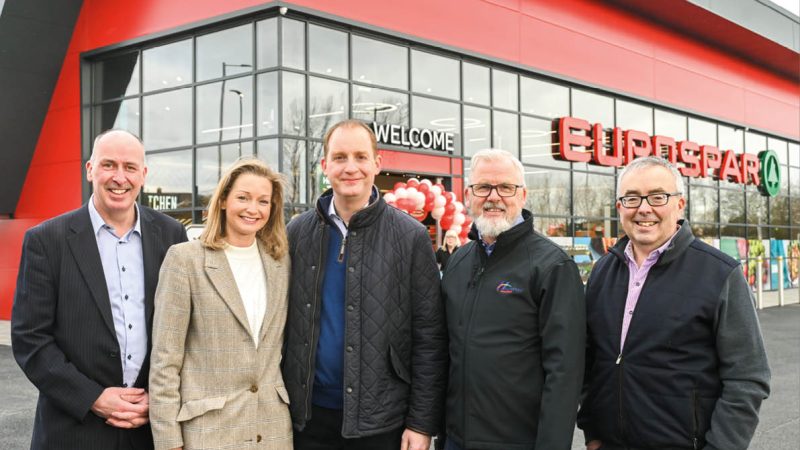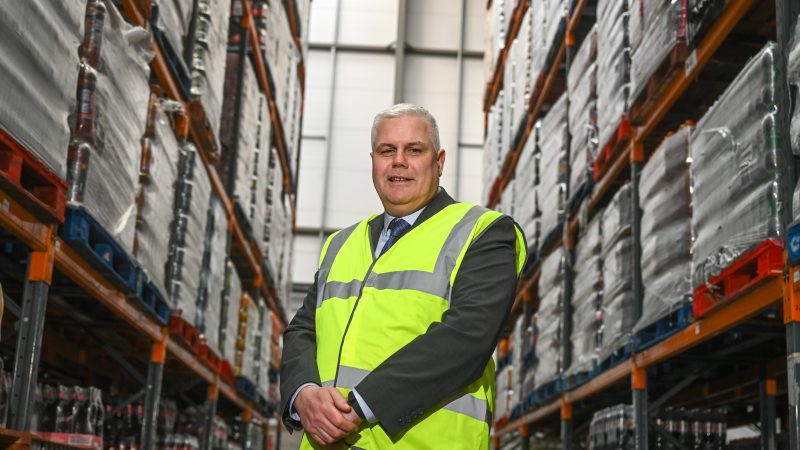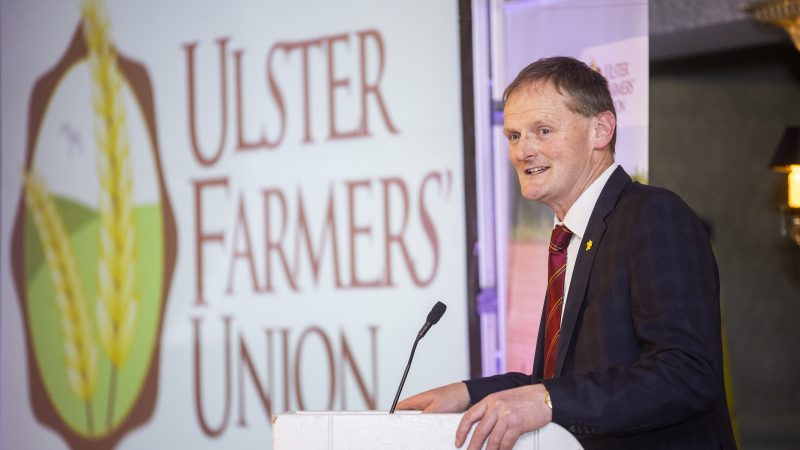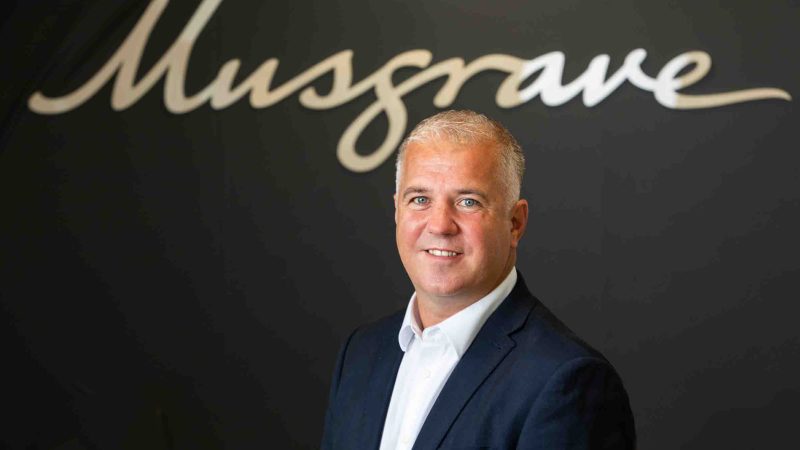Putting the retail industry at the top of the agenda

After 11 years at the helm of Retail NI, chief executive Glyn Roberts reveals why 2018 was one of the most challenging yet satisfying years for the industry in Northern Ireland
As we move into 2019, chief executive of Retail NI, Glyn Roberts is contemplative as he looks back at the past 12 months. 2018 has been one of the busiest years to date for Retail NI who have lobbied for city deals for Belfast and Derry/Londonderry, saved the small business rates relief scheme, and stopped a planned hike in car parking charges.
A particular triumph of 2018 for Retail NI was increasing their levels of political engagement culminating in the organisation of a Northern Ireland reception at Westminster. Over the year, the chief executive Retail NI also met with the Prime Minister, leader of the opposition, Taoiseach, Michel Barnier, and other senior cabinet ministers, making them aware of the issues directly affecting retailers in Northern Ireland.
“It shows the level of influence Retail NI has – not just in NI but further afield,” Retail NI chief executive, Glyn Roberts tells Neighbourhood Retailer. “For us, it is about insuring that we can represent our members at the highest level of government.”
While getting Retail NI’s voice heard by those in a position of power is an achievement, approaching a third year without a government in place at Stormont is a constant level of frustration for the organisation; especially with Brexit fast approaching. Without an Executive in place, simple issues, such as funding, can be subject to increased bureaucratic red tape, often with no clear resolution occurring.
“I think Northern Ireland, and particularly Retail NI members, deserve a lot better than the current maintenance administration with emergency budgets and no decisions being taken,” says Glyn. “With the Brexit situation it is a case of instability on instability and for the business community as a whole this is bad news. Businesses need certainty and the opportunity to see a stable government and a stable policy environment so that they can move forward.”
Although many of 2018’s challenges could be foreseen and prepared for, the fire that ravaged Primark in August of 2018 was a catastrophe that no one could have predicted. Without ministers in place to put a plan into action, Retail NI, Hospitality Ulster and Belfast City Council worked assiduously to assist the reopening of businesses within the cordon around Belfast’s Bank Buildings. Despite the lack of Executive hindering the progress, Glyn has identified a positive in the tragedy.
“The fire was probably the biggest threat to Belfast since The Troubles, but people say that from crisis comes the best innovation, and what the Primark fire has done is put the whole issue of town and city centre regeneration higher up the political agenda.
The Chancellor visited the site on a recent visit to Belfast and £2m was awarded to the city centre from the Treasury to assist in the aftermath of the fire.
“It has stimulated a debate among the general public on what type of Belfast city centre they want to see. I think for Retail NI this is a big positive, as a lot of the ideas the organisation has put out in its 20 year existence are now being taken on board by the government and the public.”
Regeneration NI
At the end of last year, Retail NI hosted a conference in Belfast during which they put forward a 47 point suggested plan for local government ahead of the general elections due to take place in May 2019.
The manifesto, titled Regeneration NI, called for radical thinking to be injected into the policy-making process and for the government to consider the opportunities that could be created with Northern Ireland’s shop vacancies.
“I’ve been very careful to say that we’re not seeing the death of the high street – we’re seeing the reconstruction of the high street,” explains Glyn. “With any reconstruction there will be casualties but independent retail is critical to the future of the 21st century high street.
“What we need to be seeing now are smaller more strategically focused shops that are learning, adapting, and innovating in town centres that are all about eco systems of lots of different types of business including a mix of retail and hospitality.”
Addressing business rates extensively in the proposal, Glyn commented that the “he would be calling for parity between NI and UK retailers and putting this injustice front and centre of policy” after Chancellor Philip Hammond promised to cut business rates by a third for small retailers in England.
Many may say that a regeneration plan for the local high street is futile without an Executive in place, but for Glyn, the issues affecting the retail sector don’t disappear because Stormont is not sitting.
Putting forward the idea of a Northern Ireland Towns and Cities Partnership to co-ordinate and manage town centre policy, Retail NI believes that devolving regeneration powers to local councils will ensure that more decisions are made directly by authorities in the local area.
Furthermore, the creation of a Rural Town Infrastructure Fund and a Future Aspects Fund were suggested to secure the future of high streets in this region.
The organisation also envisioned establishing Retail Academies in each Council area, with a tech strategy for independent retailers to improve the levels of digital literacy among independent retailers to help them grow their business in the age of technology.
Having just concluded a three year term as head of colleges in NI, Glyn recognises the huge role educational bodies’ play in supporting local economy, driving the skills agenda, and boosting small, local businesses. By creating Retail Academies across the region, he aims to inspire the next generation of retail entrepreneurs by providing short, sharp courses for those about to enter the workforce, as well as workshops for owners and store managers looking to upskill.
“In policy terms we continue to be a powerhouse for new ideas and new thinking. I think this is important because the pace of change in retail is huge – we’ve seen more change in the last three years than we have in the last 30. It’s not about managing the decline of the high street, it’s about managing the future and I think we’re seeing a much stronger independent retail sector than we were five years ago.
The future of retail
“We’re in a much more realistic position than we were 10 years ago. We still have colossal challenges like business rates that remain our top priority but we’ve seen a stark decline in the weekly trolley shop in favour of a more frequent basket shop. It’s becoming clear that in retail big is not always better.”
Glyn reports that the Retail NI members who are succeeding in the marketplace are those who foresaw the trend for more convenience-led shopping. An emphasis on supporting local is also proving popular with consumers.
“Local has gone from being a strapline for something people should be doing, to something they are doing now. It’s a badge of honour – not just for the retail and wholesale sectors but also for suppliers.
“As an organisation we are very keen to support local producers and give them a route to market through our members. In many respects Retail NI has become a supply chain organisation in its own right. Within our membership we have businesses across the supply chain from farmer, to producer, to processor, to wholesaler, to retailer. It creates great relationships within our membership and ensures that everyone throughout the supply chain understands the challenges and pressures that are there.”
Retail NI are also seeing an increasing number of non-food retailers join the ranks.
“Whatever you sell as an independent retailer, your home is with us,” says Glyn. “Whether you sell eggs or socks, the issues of rates, car parking, and town centre regeneration are all the same.
“In 2019 there will be even bigger challenges to contend with but I’m hoping that next year will see continued growth for our members – they are certainly more confident than they have been in the past but they’re not complacent.









